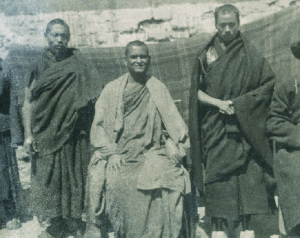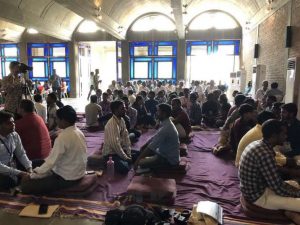Buddhacarita or Acts of the Buddha
Author: Asvaghosa
Translation and Commentary by E.H. Johnston, 2004 edition
Asvaghosa was an ancient Indian dramatist and is one of my literary heroes. I find great authority and power in his poems because I feel that one can understand what kind of Buddhist he was after reading them. He was probably one who respected tradition, but relatively sympathetic toward those who found the Buddha’s deeds too remote, even heartless. For me, a very poignant picture of the playwright emerges from his Buddhacarita, or Acts of the Buddha. This biographical poem is indispensable reading for anyone who
desires a more balanced, nuanced picture of the historical Buddhist experience. Unlike most sutras, which are necessarily dry and systematic in their revelation of the Buddha’s perfection, Asvaghosa brought an incredibly sensual quality to the figures of early Buddhism, bringing them to life in a way that the sutras could not (and did not intend to).
It can even be wondered why he bothered to. For a dramatist who wanted to preach Dharma to non-Buddhists, it is slightly puzzling to witness the effort and craftsmanship he devotes to humanizing those who actually oppose the Buddha’s ideas. These people include the Buddha’s father, stepmother, wife, and essentially everyone who did not understand his wisdom. Even the courtesans – the very same “whores” who Gautama despises before he flees the palace – are given considerable sympathy as they realize that he will not return (Canto viii, 30). I can only interpret Asvaghosa’s as using some method of skilful means (upaya) to empathize with non-Buddhists and identify with their doubts.
As a layman who was probably once of the Brahmanic faith, Asvaghosa was sensitive to objections against the Buddhist movement (he probably entertained them himself before his conversion): it was anti-family. It was anti-social. It was even anti-Dharma due to its subversion of Vedic values. This sensitivity is most evident in the chapter of “Lamentations in the Palace”, where those closest to Gautama mourn his departure into the quest for enlightenment. It is extraordinary and impressive that Buddhacarita’s author paid close attention to the contradictory emotions of Gotami (the Buddha’s stepmother). She declares that her adopted son is the pinnacle of physical perfection and is too dignified to live in a hermitage, yet laments that treading on the hard jungle ground will hurt his “tender lotus” feet (Canto viii, 53, 55). She exalts his powerful royal body, but in the same breath wails that it cannot last in the forest heat, cold, and rain (56). Such details about the fragility and absurdity of the human heart speak favourably of the poem’s author as a thoughtful and complex man.
Asvaghosa also gives considerable attention to the pain and suffering of the Buddha’s wife, Yashodara. It is only in Buddhacarita that we really experience the full emotional weight of Gautama’s abrupt departure. I do not know of any other Buddhist literature that brings such a realistic, human quality to Yasodhara, especially when she accuses Gautama, his attendant (Chandaka), and horse (Kanthaka) of conspiring against her:
‘Then spoke up Yasodhara, her eyes reddened with anger, her voice choking with bitterness born of despair, her bosom heaving with sighs, tears streaming down with the grief she was enduring: –
Where, Chandaka, has he gone, my heart’s desire, after deserting me at night against my will while I slept… Why do you weep here to-day, you brute, after doing me an ignoble, unkind, unfriendly deed? Hold back your tears, be contented in mind. Tears go ill with that deed of yours… For your imprudence and so-called friendship have wrought great ruin for this family…
This horse Kanthaka too must have been desirous of my ruin in every way… To-day the base creature neighs loudly, filling as it were the royal abode; but when he was carrying away my beloved, it was then that the wretched horse was dumb.
… When Chandaka heard the princess’s words, with their undercurrent of lament and with their syllables strangled with sobs, he looked downwards… ’ (Canto viii, 31 – 42)
Is it moral to harm a loved one to benefit many? Answering “yes” is usually the utilitarian answer to Gautama’s renunciation. To Asvaghosa’s Yasodhara, this is missing the point:
If he wishes to carry out Dharma and yet casts me off, his lawful partner in the duties of religion and now husbandless, in what respect is there Dharma for him who wishes to follow austerities separated from his lawful partner? Surely he has not heard of our ancestors… the other kings of old, who took their wives with them to the forest, since he thus intends to carry out Dharma without me (Canto viii, 62).
Here, Yasodhara seems to be accusing Gautama of assuming that she would be a needless attachment, a hindrance, when she could very well be a partner to his spiritual search. Yasodhara is not angry with the Lord for having become a renunciant, but for assuming that she would not be fit to accompany him. Her words are particularly sarcastic here, and her fury can be felt underneath Asvaghosa’s writing:
Being distinguished for Dharma, he must have held my mind to be secretly and repeatedly driven to jealousy and quarrelling; so light and without fear deserting me as being of a wrathful nature… Alas, if my lord is tender in body and high in spirit, how cruel and exceedingly hard is his mind, when in sooth he abandons our infant son with his babbling talk, who could charm even an enemy’ (64, 68).
Is Yasodhara being overemotional and hypocritical? Or is she right? It is difficult to figure out Asvaghosa’s reasons for portraying her in such a sympathetic light. I do not hesitate to assert that he will make many modern readers cheer for the Buddha’s loved ones. I cannot help but think that this was partly his intention all along, even if it remains mysterious.
I also recommend Asvaghosa’s other work, Handsome Nanda, which gives a stunningly sensuous account of the marriage between the Buddha’s cousin and his kittenish wife. Some Sanskrit scholars have wondered how Asvaghosa expected to convince anyone to take monastic vows after writing about the couple’s amorous and copious lovemaking, the erotic games between husband and wife, and the blissful domestic life of a married couple. I have seen less ideal situations in books celebrating romance. It is subversive that the detached corpus of Buddhist literature has the author of Buddhacarita and Handsome Nanda as one of its representatives. For a Buddhist thinker, Asvaghosa is a provocative troublemaker who does not (or refuses to) fall in line with the genre. And I love it.













